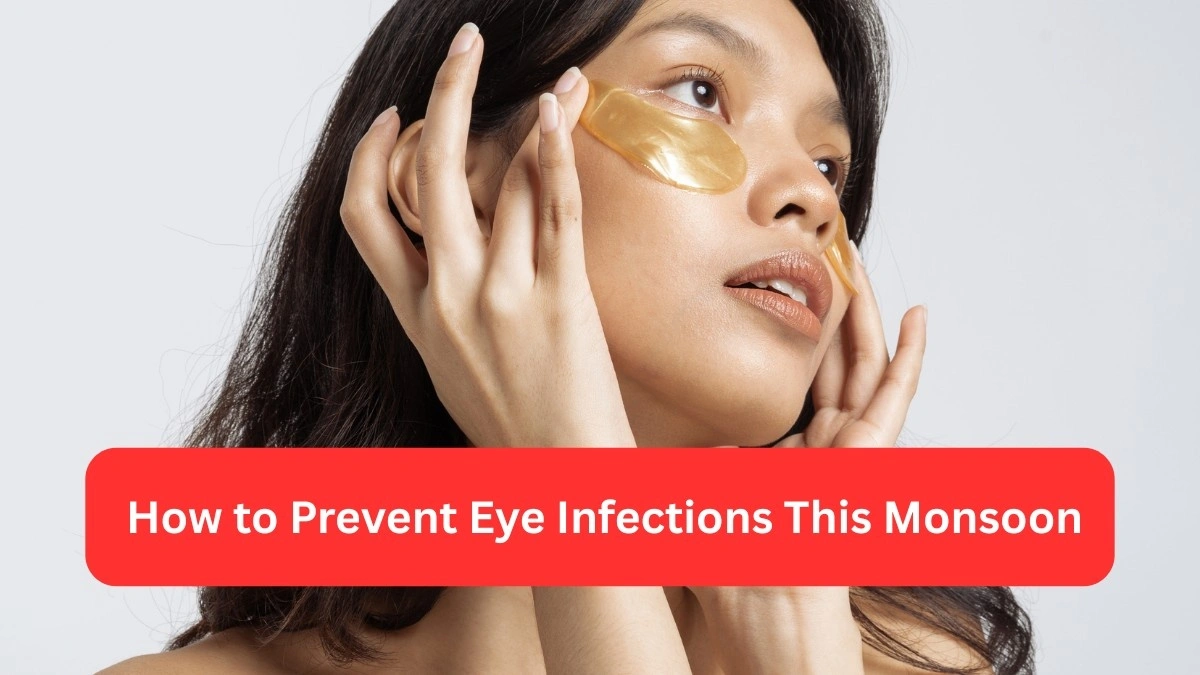Introduction: When Rain Showers Bring More Than Just Relief…
I still remember one monsoon afternoon when my cousin returned from school with red, itchy eyes. What started as a harmless drizzle turned into days of blurry vision, stinging pain, and missed classes. Monsoon, while a season of romance and relief, brings an uninvited guest to many of our lives—eye infections.
From conjunctivitis (pink eye) outbreaks in schools to styes that ruin your weekend plans, eye infections spike dramatically during this season. The humidity, damp environment, and increased bacteria make our eyes especially vulnerable. But here’s the good news: most of these infections are easily preventable—with a bit of awareness, hygiene, and natural care.
In this guide, you’ll learn not just how to shield your eyes from monsoon-related infections, but also ancient Ayurvedic insights, modern science-backed tips, and daily practices to keep your vision safe and clear—even during the wettest months.
What Are Eye Infections and Why Are They Common in Monsoon?
Eye infections occur when bacteria, viruses, or fungi invade the eye or its surrounding tissues. During monsoon, the increased moisture and stagnant water become breeding grounds for pathogens. Our frequent habit of touching our faces, sharing towels, or stepping into contaminated rainwater adds fuel to the fire.
Common Eye Infections in Monsoon:
- Conjunctivitis (Pink Eye): Highly contagious, causes redness, itching, and discharge.
- Stye (Hordeolum): A painful bump near the eyelid caused by bacterial infection.
- Keratitis: Inflammation of the cornea, especially among contact lens users.
- Fungal Eye Infections: From exposure to dirty water or mud splashes.
- Allergic Conjunctivitis: Triggered by pollen, dust, and mold in damp environments.
7 Best Tips to Prevent Eye Infections This Monsoon
Let’s cut to the chase—prevention is always better than cure. Here’s how you can protect your eyes this rainy season:
1. Wash Your Hands Frequently
👉 The number one rule: Clean hands mean clean eyes.
We often rub our eyes without thinking—making it easy for germs to enter. Use antibacterial soap and dry your hands with a clean towel.
2. Avoid Touching or Rubbing Eyes
Even a simple itch can turn into an infection. If irritation persists, use a sterile saline wash or cold compress instead.
3. Never Share Eye Products
⚠ Eye drops, makeup, handkerchiefs, and towels—these are all personal. Sharing them, even with family, can transfer infections.
4. Use Protective Eyewear in the Rain
Rainwater can carry pollutants and microorganisms. If you’re riding a two-wheeler, wear protective glasses or visors to avoid splashes.
5. Clean Contact Lenses Properly
According to the American Optometric Association, improper lens hygiene is a leading cause of eye infections.
✅ Tips:
- Disinfect lenses daily
- Never use rainwater or tap water
- Avoid wearing lenses for long hours in humid weather
6. Strengthen Immunity with a Balanced Diet
💡 Did You Know? Vitamin A, C, E, and Zinc are crucial for eye health. Include spinach, carrots, almonds, citrus fruits, and leafy greens in your diet.
7. Apply Ayurvedic Rose Water or Triphala Wash
According to Ayurveda, regular eye wash with rose water or Triphala decoction can cleanse, refresh, and prevent eye disorders naturally.
Science + Ayurveda: What Experts Say
🧬 Scientific Perspective:
- WHO recognizes conjunctivitis as one of the most prevalent infections in the rainy season.
- Studies in PubMed Central show that bacterial conjunctivitis spreads fastest in humid, urban settings—like many parts of India during monsoon.
- Eye specialists recommend daily cleansing routines, good nutrition, and avoiding contaminated water.
🌿 Ayurvedic Wisdom:
- According to Sushruta Samhita, eye care is central to daily health (Dinacharya).
- Triphala, a blend of Amalaki, Bibhitaki, and Haritaki, is known for anti-inflammatory and antimicrobial properties.
- Ancient healers used cow ghee, rosewater, and alum (Fitkari) for cleansing and soothing tired or infected eyes.
🧴 DIY Eye Cleansing Routine at Home
🌼 Daily Eye Wash with Triphala:
Ingredients:
- 1 tsp Triphala powder
- 1 glass of water
Steps:
- Boil Triphala powder in water for 5 mins.
- Cool and strain through a muslin cloth.
- Use it to gently rinse eyes in the morning.
⚠ Make fresh every day. Don’t store overnight.
🌹 Rose Water Compress:
- Soak sterile cotton in organic rose water.
- Place on closed eyes for 10 minutes to relieve redness and inflammation.
⚠️ Side Effects & Safety Concerns
While natural remedies are powerful, they must be used wisely.
🚫 Avoid these during infection:
- Wearing contact lenses or eye makeup
- Swimming in public pools
- Using unclean towels or pillowcases
⚠ Who Should Be Cautious?
- Children: prone to touching eyes often.
- Elderly: lower immunity makes infections riskier.
- Pregnant women: consult doctor before using herbal washes.
👉 Important: Always consult an ophthalmologist if symptoms persist for more than 2 days or if vision is affected.
Personal Reflection: Why I Started Caring More During Monsoon
As someone who wears contact lenses daily, I once ignored mild redness thinking it was dust. Within 24 hours, I was in an eye clinic being treated for a bacterial infection. That experience changed how I treat my eyes in the monsoon. Since then, I follow my 3 golden rules: Don’t touch, clean daily, and eat for the eyes.
Modern Solutions vs. Traditional Remedies
| Aspect | Modern Eye Drops | Ayurvedic Washes (Triphala, Rosewater) |
|---|---|---|
| Fast Relief | ✅ Yes | ✅ Yes (with regular use) |
| Chemicals Involved | Yes | No |
| Side Effects | Possible irritation | Rare, if prepared hygienically |
| Cost | Moderate | Low |
| Long-Term Use | Not advised | Safe under guidance |
❓ People Also Ask: FAQs About Eye Care in Monsoon
1. How do I know if my eye infection is serious?
If you have severe pain, blurry vision, or swelling around the eye, visit an eye specialist immediately.
2. Can I use rose water for eyes daily?
Yes, but make sure it is pure, chemical-free, and ophthalmic grade.
3. Should I wear sunglasses in the rain?
Yes! Protective glasses shield your eyes from rainwater splashes, dust, and germs.
4. Is Triphala water safe for eyes?
Yes, if prepared hygienically and used fresh. Avoid using it if you have active infections or wounds.
5. Can I wear lenses during monsoon?
Yes, but maintain strict hygiene and avoid using them during infection or excessive humidity.
6. What are natural ways to prevent styes?
Keep eyelids clean, avoid oily makeup, and apply warm compresses regularly.
7. Is conjunctivitis contagious through air?
Mostly through hand-to-eye contact or shared items, not via air.
8. Can alum be used for eye infections?
Alum (Fitkari) has antimicrobial properties, but using it near eyes is not recommended without expert advice.
Final Words: Care for Your Eyes, Rain or Shine
Monsoon brings joy, but don’t let it blur your vision—literally or metaphorically. Eye infections are not just painful; they can disrupt your entire rhythm. With just a few mindful habits and natural remedies, you can enjoy the rains without any redness or regret.
If you care for your skin during monsoon, why not your eyes too? Start your eye care journey today—naturally, safely, and wisely.




